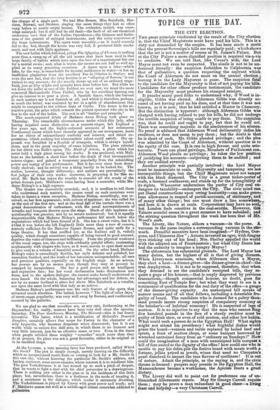TOPICS OF TILE DAY.
THE CITY ELECTION.
THE great principle vindicated by the result of the City election is, that the Chief Magistrate must have paid his bills. This is 'a duty not demanded by the empire. It has been made a merit
that the present Sovereign's bills are regularly paid.; which shows that the act is not a matter of course at St. James's Palace. But at the City Palace a more dignified position is required vis-a-vis to creditors. We are told that, like Caesar's wife, the Lord Mayor must not even be suspected. The simile is not to be un- derstood literally : the suspicion forbidden to Calphurnia was that of gallantries, a question respecting the aspirant which the Court of Aldermen do not moot on the annual election leaving it to the Lady Mayoress in posse. The suspicion fate/ to the candidate for the Mayoralty is that of not paying his bills. Candidates for other offices produce testimonials, the candidate for the Mayoralty must produce his stamped receipts.
It puzzles many good folks to understand why, if Wood is in- eligible, Gibbs was elected. Alderman Gibbs was directly ac- cused of not having paid up his dues, and at that time it was not known, as it is now, that he had satisfied a Master in Chancery. But the distinction is apparent : although Alderman Gibbs was charged with having refused to pay his bills, he did not undergo the terrible suspicion of being unable to pay them. The suspicion was, that he could and ought to pay, but that he would not. There was something majestic in the absoluteness of his silence. No proof is adduced that Alderman Wood deliberately defies his creditors, or does not mean to pay them ; but the doubt is that he is short of cash. Mr. Gibbs pleaded privilege ; and the plea. was admitted by the Court of Aldermen, without question as to the equity of the case. It is one in high favour, and quite aris- tocratic. Peers can plead privilege, Members of Parliament can. Alderman Wood pleads no privilege ; he takes the low position of justifying his accounts—subjecting them to be audited ; and they are audited severely. Another principle was partially involved : the Lord Mayor
must be immaculate in coals. Mayoralty and tampering are not incompatible things, but the Chief Magistrate must not tamper with the black diamond. The City is a great ticket-porter of• . coals, a licensed coalheaver,- and stands up for the intangibility of its rights. Whosoever undermines the purity of City coal en- - dangers its taxability—endangers the City. The civic mind can , put liberal constructions upon erring humanity—can. snake gene.. rous allowances in respect of parish-accounts, of stationery, and of many other things ; but one must draw a line somewhere,, and here it is drawn at coals. Corporations may have no soul, but London feels sensitive in the coal-scuttle. However, this Talacre scandal seems in a great measure to have subsided; and the stirring question throughout the week has been that of Mr. Wood's cash.
The Livery, like Nature, abhors a vacuum—in the purse. A.
vacuum in the purse implies a corresponding vacuum in the sew- mach. Dreadful monsters have been imagined—" Hydras, Gor- gone, and Chimaeras dire " ; Ariosto invented an ogre, with fungus eyes sticking out of his head ; Mrs. Shelley appalled the world with the adopted son of Frankenstein ; but what City Dante has had the audacity to imagine a hungry Mayor ? The abhorrence has substantial grounds. The Lord Mayor has
many duties, but the highest of all is that of giving dinners. When Liverymen nominate, when Aldermen elect a Mayor, they elect a host—a dinner-giver—the dinner-giver-in-chief—the true Amphytrion. It is not to be supposed, therefore, that when they demand to see the candidate's receipted bills, they re- quire a gage of his honour,—that is amply disproved by previous transactions,—though commercial honour, no doubt, goes for something East of Temple Bar ; but what they want to see is a testimonial of qualification for the real duty of the office—a gauge of the dinner-giving. capacity. An unreceipted bill speaks of narrow means and of all that follows, including a detestable fru- gality of board. The candidate who is dunned for a paltry thou- sand pounds incurs strong suspicion of compulsory economy at the butcher's—of habitual economy I He is suspected of legs of mutton. It is no injustice to say that the man who cannot fling five hundred pounds in the face of a sturdy creditor must be guilty of Irish stew, or even of cold mutton, and other low habits. What could such a person do in the Egyptian' Hall? What sights might not attend his presidency I what frightful dishes would grace the board—venison and turtle replaced by boiled beef and sprats, a feast of mutton chops, or some banquet borrowed by wretched untrained fancy from an " ordinary on Sundays I" How could the imagination of a man with unreceipted bills compass a bill of fare suited to the dignity of the office? how could one who is unable to pay his' debts, pile the festive board with meats worth a fortune, jellies priced as jewels, wines that need no Cleopatra's pearl dissolved to impart the true flavour of costliness? It is out of nature. Admit the principle, as the saying is, and the civic throne is doomed : paupers may preside in the Egyptian Hall, the Mansionhouse become a workhouse, the Apichin feasts a gruel dietary. The Livery did well to point out for preference one of un- blemished Aldermanic repute. May Sir George Carroll requite them ; may he prove a man redundant in good cheer—a living feast and holyday--a very Christmas Carroll.


























 Previous page
Previous page